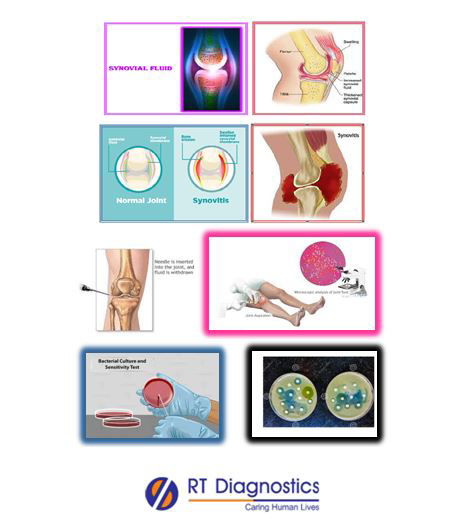Culture & Sensitivity - Synovial Fluid
Synovial Fluid is present in the joints and produced by the synovial membranes and its acts as a lubricant between the bones. Culture and sensitivity on synovial fluid analyze the growth of the pathogen in the fluid and help to identify the reason for joint inflammation and joint pain.
Culture & Sensitivity – Synovial Fluid:
Why Culture and Sensitivity - Synovial Fluid Test?
CLINICAL INFORMATION
The synovial fluid analysis is also known as joint fluid analysis may be ordered to help diagnose the cause of joint inflammation, pain, swelling and fluid accumulation. The function of the synovial fluid is to supply nutrition and disposal of metabolic end products, lubricate the joints and absorb shock. Diseases associated with synovial fluid are of two types inflammatory type and non-inflammatory type. Some of the diseases are an auto-immune disease that leads to chronic synovitis (inflammation of synovial membrane), degenerative osteoarthritis (synovial fluid becomes less viscous and inflammatory substances come into direct contact with sensory nerve cells in the joints producing pain), rheumatoid arthritis, gout, tubercular arthritis (mycobacterium tuberculin – and acid-fast bacilli), pyogenic arthritis or septic arthritis (increased amount of lactate accumulation), systemic lupus erythematosus, psoriatic arthritis, ankylosing spondylitis etc. The test analysis checks for changes in the physical properties like colour, viscosity and screens for changes in the fluid’s biochemical composition. Determination of inflammatory infiltrate is detected by adding acetic acid to the synovial fluid specimen. If a mucin clot is formed it shows the presence of inflammatory cells. Estimation of lactate levels in septic arthritis. Microscopic analysis for the presence of monosodium urate crystals (gout), calcium phosphate (pseudo-gout), corticosteroid crystals and hydroxyl apatite crystals (detected by alizarin red stain), smear study in the synovial fluid specimen for detection of acid-fast bacilli.
Symptoms include pain, stiffness, swelling, cracking sound (since synovial fluid level reduces to fill the expanding volume of the joints negative pressure is formed and carbon-di-oxide gets filled up in the space and this bubble formation is called as cavitation leading to crackling sound) etc. Synovial fluid test for culture and sensitivity is performed to screen for the presence of any harmful microbial pathogens behind its associated disease eg. Osteomyelitis. Hence the synovial fluid is aspirated for culture studies to identify the pathogenic micro-organism and followed by susceptibility tests for effective therapy. Other tests include imaging studies like X-rays etc.

General Instructions:
Sample Requirement: Specimen –Synovial fluid. Test Preparation: None.
NOTE - Sample for specimen collections may vary based on the patient’s condition/cases according to the patient’s presenting complaints/signs or symptoms:
SPECIMEN REQUIREMENT (Special or Rare Cases) - As instructed and guided by Physician / Clinician / Pathologist / as per Laboratory’s requirements, according to procedures and protocols.
This Multi-Specialty Clinical Referral Laboratory RTDIAGNOSTICS provides precise and accurate tests with an extensive range of testing services to the medical centres to help in the diagnosis and identification of pathology in the test specimens for infectious diseases and also to evaluate the function of organ systems of the patient. It prevents further complications and helps to stabilize and restore health to near normalcy at the earliest without delay.



